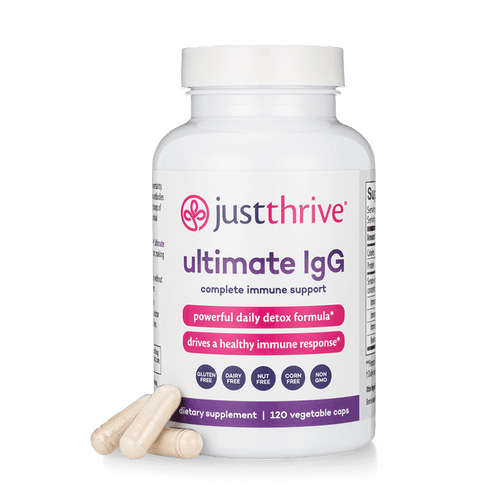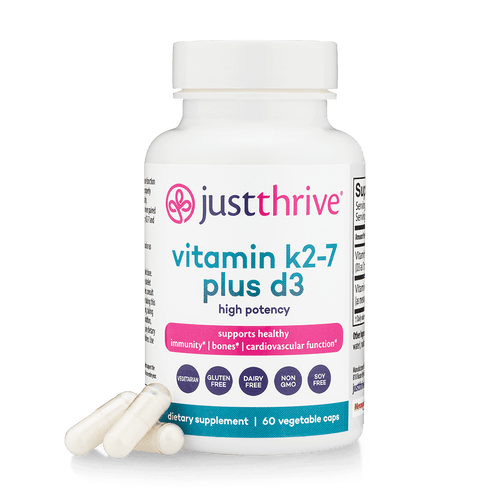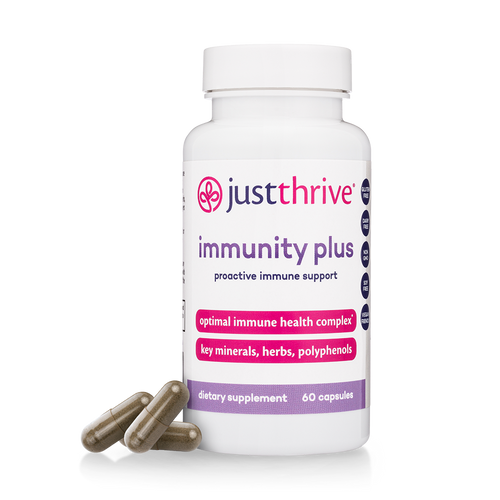And the best way to protect yourself against it
Mold may be sabotaging your health in more ways than you realize.
Even if you think you haven’t been exposed to mold, you probably have. Now you may be thinking that you’d know if you were exposed to mold. You’d see it or smell it. Or at least realize your basement was damp. But that’s not where most of your mold exposure comes from.
Mold exposure can lead to a wide variety of confusing and serious health issues, from chronic sinusitis to organ damage. Unfortunately, mold toxicity usually goes undiagnosed. And that can cause serious treatment complications.
Because if you don’t deal with mold toxicity, it can thwart treatments and do long-term damage to your health.
That’s why it’s so important to take a proactive approach that mitigates mold exposure and protects your health. And as it turns out, one of your best strategies is to reinforce one of your body’s most important immune system soldiers. More on that in a minute, but first…
If you think you know all the places where mold lurks, you need to see this...
You’re Exposed to Mold More Than You Think
Mold exposure is practically unavoidable—it’s everywhere. Mold shows up in damp buildings, even if they’re not damp anymore, and mold spores fill the air you breathe. It’s even in you the food you’re eating, whether you can taste it or not.[1]

In fact, according to studies, mold is rampant in the food supply.[2] Mold can infect crops before or after they’re harvested. And when animals eat mold-laden food, they can pass it through to you in things like dairy products and meats. Likely food sources of mold include:
- Coffee
- Dried fruit
- Oats
- Pistachios
- Peanuts
- Cocoa
- Grapes
You can also be exposed to mold inside, outside… basically everywhere. Plus, mold spores can attach to things like shoes, pets, even grocery bags.[3] And that means they can travel with you anywhere you go.

Mold and Mold Toxicity
Many types of mold produce mycotoxins, poisonous compounds that can make you feel sick and cause frightening health complications.[4]
The most common mycotoxins include ochratoxin A, fumonisins, and aflatoxins… and any of these hazardous poisons can trigger significant health problems.[5]
They can attack any organ or system, and they can set off dozens of seemingly unrelated symptoms that make it very hard for doctors to correctly diagnose the real problem.
How does mold toxicity cause so many different problems? It starts by attacking your immune system… usually through your gut, which houses 70–80% of your immune system. So not only do mold toxins cause symptoms themselves, they also undermine your general immunity.
That can lead to severe—even deadly—health problems… And all the more reason why you need to give your immune system targeted support to help it flush out mold and mycotoxins.
5 Ways Mold Toxicity Threatens Your Health
Mold toxicity can cause an alarming list of symptoms ranging from insomnia to painful rashes to chronic diarrhea. And along with these issues, mold exposure can also lead to high-level health threats that put your wellness and your life at risk.
1. Deadly Heart Problems
Mycotoxins have been linked with severe cardiovascular diseases[6] such as atherosclerosis (blocked arteries) and hypertension.[7] Both of these conditions can lead to heart attack, stroke, and sudden cardiac death.[8]
2. Memory and Mood Disorders
Mold toxicity affects brain cells in a few different ways.[9] It can trigger depression, anxiety, and other devastating psychiatric disorders. At the same time, mycotoxins can cause brain fog, memory loss, attention problems, and confusion. In some cases, it can cause a type of Alzheimer’s disease (this form is reversible when diagnosed and treated properly).[10]
3. Long-Lasting Pain
Mycotoxins can trigger a prolonged inflammatory response[11], leading to painful conditions such as rheumatoid arthritis, chronic fatigue syndrome, and fibromyalgia.[12]
4. Cancer
Mycotoxin exposure has been linked with different types of cancer[13], with the strongest ties being to liver cancer. Mold toxicity has also been linked to:
- cancer of the esophagus[14]
- colon cancer[15]
- breast cancer[16]
5. Gut Problems
Mold and mycotoxins frequently sneak in with food, making your GI (gastrointestinal) system the first target. They often specifically attack the gut barrier[17], which is made up of a layer of cells that forms an essential border between your gut and your bloodstream. When the gut barrier weakens, mycotoxins can escape into your bloodstream, causing damage anywhere in your body.[18]
Mycotoxins also attack your gut microbiome[19]—the trillions of bacteria that live in your gut. Mold toxicity flips the balance in your microbiome, allowing pathogens to substantially outnumber beneficial probiotic bacteria. That sets the stage for a host of GI issues including irritable bowel syndrome, chronic diarrhea, and inflammatory bowel diseases such as ulcerative colitis.
NOTE: About 25% of people have a genetic vulnerability to mold.[20] If you have this predisposition, your immune system can’t recognize and neutralize mycotoxins effectively. And that gives them a chance to build up in your body and cause all kinds of problems.
How Your Body Manages Mold and Mycotoxins
Your immune system has special soldiers called immunoglobulins (also known as antibodies) that constantly patrol for threats—including mold and mycotoxins. Once those immunoglobulins find and identify the threat, they take steps to neutralize it and remove it from your body.
But when your immune system gets overwhelmed by mold and mycotoxins, it may need extra support to keep fighting and keep you healthy. And the best form of support is supplemental IgG, especially a form called serum-derived bovine immunoglobulins.
Taking these clinically proven immunoglobulin supplements[21] helps your immune system maintain balance. And just like the immunoglobulins created by your immune system, serum-derived bovine immunoglobulin supplements bind and neutralize toxins[22], and that helps support healthy immune function.
Give Your Body Targeted Immune and Detox Support with Ultimate IgG
Your immune system works for you 24/7 with no breaks. It’s constantly protecting you against a wide variety of potential threats.
And you can imagine how exhausting that must be!
So give your immune system some love and support with Just Thrive Ultimate IgG.
Ultimate IgG provides your immune system with a healthy supply of IgG and other essential immunoglobulins that help:
- Drives a balanced immune response
- Promote a healthy and strong gut barrier
- Supports body detoxification by mopping up toxic residue
- Helps maintain healthy digestion
- Fosters a healthy inflammatory response
And if you’re not sure about trying Ultimate IgG… we can help with that.
EVERY Just Thrive purchase is covered by our Bottom of the Bottle, 100% money back guarantee.
So you can try Ultimate IgG to see if it works for you… and we’re confident that it will.
But if for any reason you don’t feel a difference, simply request a full product refund at any time. Doesn’t matter if it’s 3 months or even 3 years later. It doesn’t even matter if the bottle is empty! You’ll get your money back any time, no matter what.
>> Try Ultimate IgG 100% RISK FREE, and save 30% on your first month’s subscription with code SUB30.
Sources
- Kuhn DM, Ghannoum MA. Indoor mold, toxigenic fungi, and Stachybotrys chartarum: infectious disease perspective. Clin Microbiol Rev. 2003;16(1):144-172. doi:10.1128/CMR.16.1.144-172.2003
- Kumar P, Mahato DK, Kamle M, Mohanta TK, Kang SG. Aflatoxins: A Global Concern for Food Safety, Human Health and Their Management. Front Microbiol. 2017;7:2170. Published 2017 Jan 17. doi:10.3389/fmicb.2016.02170
- Centers for Disease Control and Prevention (CDC). Mold. Published September 26, 2024. Accessed March 19, 2025. https://www.cdc.gov/mold-health/about/
- World Health Organization. Mycotoxins. Published October 2, 2023. Accessed March 19, 2025. https://www.who.int/news-room/fact-sheets/detail/mycotoxins
- Bennett JW, Klich M. Mycotoxins. Clin Microbiol Rev. 2003;16(3):497-516. doi:10.1128/CMR.16.3.497-516.2003
- Wang K, Liu S, Zhang X, Sun D. Toxic effect of mycotoxins on the cardiovascular system: A topic worthy of further study. Food Rev Int. 2021;39(4):2203-2211. doi:10.1080/87559129.2021.1950172
- Zain ME. Impact of mycotoxins on humans and animals. J Saudi Chem Soc. 2011;15(2):129-144. doi:10.1016/j.jscs.2010.06.006
- Verdecchia P, Angeli F, Cavallini C, et al. Sudden cardiac death in hypertensive patients. Hypertension. 2019;73(5):1071-1078. doi:10.1161/HYPERTENSIONAHA.119.12684
- Tsafrir JS. Mold toxicity: A common cause of psychiatric symptoms. Psychology Today. Published August 3, 2017. Reviewed by Perina K. Accessed March 29, 2025. https://www.psychologytoday.com/us/blog/holistic-psychiatry/201708/mold-toxicity-a-common-cause-of-psychiatric-symptoms
- Bredesen DE. Inhalational Alzheimer's disease: an unrecognized - and treatable - epidemic. Aging (Albany NY). 2016;8(2):304-313. doi:10.18632/aging.100896
- Bredesen DE. Inhalational Alzheimer's disease: an unrecognized - and treatable - epidemic. Aging (Albany NY). 2016;8(2):304-313. doi:10.18632/aging.100896
- Brewer JH, Thrasher JD, Straus DC, Madison RA, Hooper D. Detection of mycotoxins in patients with chronic fatigue syndrome. Toxins (Basel). 2013;5(4):605-617. Published 2013 Apr 11. doi:10.3390/toxins5040605
- Claeys L, Romano C, De Ruyck K, et al. Mycotoxin exposure and human cancer risk: A systematic review of epidemiological studies. Comprehensive Reviews in Food Science and Food Safety. Published May 20, 2020. doi:10.1111/1541-4337.12567
- Xue KS, Tang L, Sun G, et al. Mycotoxin exposure is associated with increased risk of esophageal squamous cell carcinoma in Huaian area, China. BMC Cancer. 2019;19:1218. doi:10.1186/s12885-019-6439-x
- Liew WP, Mohd-Redzwan S. Mycotoxin: Its impact on gut health and microbiota. Front Cell Infect Microbiol. 2018;8:60. doi:10.3389/fcimb.2018.00060
- Belhassen H, Jiménez-Díaz I, Arrebola JP, et al. Zearalenone and its metabolites in urine and breast cancer risk: a case-control study in Tunisia. Chemosphere. 2015;128:1-6. doi:10.1016/j.chemosphere.2014.12.055
- Liew WP, Mohd-Redzwan S. Mycotoxin: Its Impact on Gut Health and Microbiota. Front Cell Infect Microbiol. 2018;8:60. Published 2018 Feb 26. doi:10.3389/fcimb.2018.00060
- Gao Y, Meng L, Liu H, Wang J, Zheng N. The Compromised Intestinal Barrier Induced by Mycotoxins. Toxins (Basel). 2020;12(10):619. Published 2020 Sep 28. doi:10.3390/toxins12100619
- Liew WP, Mohd-Redzwan S. Mycotoxin: Its Impact on Gut Health and Microbiota. Front Cell Infect Microbiol. 2018;8:60. Published 2018 Feb 26. doi:10.3389/fcimb.2018.00060
- Valtonen V. Clinical Diagnosis of the Dampness and Mold Hypersensitivity Syndrome: Review of the Literature and Suggested Diagnostic Criteria. Front Immunol. 2017;8:951. Published 2017 Aug 10. doi:10.3389/fimmu.2017.00951
- Petschow BW, Burnett B, Shaw AL, Weaver EM, Klein GL. Serum-derived bovine immunoglobulin/protein isolate: postulated mechanism of action for management of enteropathy. Clin Exp Gastroenterol. 2014;7:181-190. Published 2014 May 24. doi:10.2147/CEG.S62823
- Ulfman LH, Leusen JHW, Savelkoul HFJ, Warner JO, van Neerven RJJ. Effects of bovine immunoglobulins on immune function, allergy, and infection. Front Nutr. 2018;5:52. doi:10.3389/fnut.2018.00052














